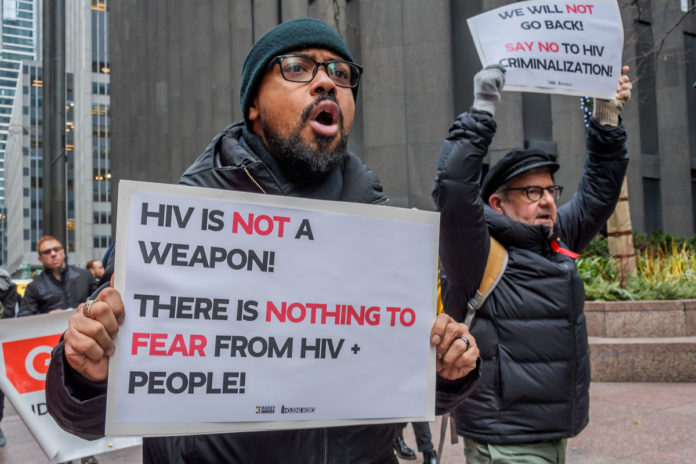
Photograph by Erik McGregor/LightRocket via Getty Images
We met at a friend’s Super Bowl party more than 10 years ago. I’m no real fan of the sport, although I will check out the fine players on either team. Really, I am only down for a fabulous halftime show. In 2007, Prince did the honors, and his royal badness did not let us down.
I noticed the brother a few minutes before my friend introduced us. Within minutes, we found ourselves in a little corner off the kitchen. He was playful and blunt about his desires, and that turned me on. We hooked up one time only, a few weeks after the party. I have long forgotten what we did on our date prior to coming back to his place. Minutes after we got inside, we started kissing. Knowing where this was headed, I asked for a pause and told him I was HIV-positive. He said that was no problem, and we resumed, unfurling clothes from the sofa to his carpeted floor. In the fateful seconds that followed, fear and desire commingled—not because I really feared spreading infection, but because I feared Georgia laws against people living with HIV. Finally, I stopped and said something like, “We can’t do this.”
It was a month later when the friend who introduced us brought me the news. “Darvin” had tested positive. Darvin had told her about our recent encounter. She assured me that Darvin had not mentioned any suspicion that I might have infected him through our interaction. I felt my heartbeat quickening, my head growing heavy and hot. I began replaying our evening in my head, scanning for risks taken. I reminded myself that my viral load was undetectable and therefore untransmissible. Besides, I reasoned that I was probably not his first or sole HIV+ partner. But I knew enough to know that none of this could shield me from repercussions, whether or not they were deserved.
By 2007, I had been HIV+ for 22 years. I had spent the past 13 years working as an AIDS educator and activist. Knowing about HIV criminalization was a given for my profession and my personal protection. I knew that neither actual transmission nor intent to transmit were needed for me to be prosecuted should my date allege that I had sex with him without sharing my HIV status. Darvin was now positive. Would he falsely accuse me, even though I probably did not infect him? My only defense under Georgia law would have been proof of disclosure. I had no documentation, no recording, no text message, or signed letter showing what I had told him before our consensual activity.
I realized that none of my actions that night, and none of my AIDS activism over the years, would keep me from going to jail and being branded a “sex offender.” My public image as an openly HIV+ Black gay figure, developed through years of dedicated work, would not meet the standard for disclosure. I could be arrested at the whim of a disgruntled partner whom I had never called for a second date.
• • •
The most insidious mistruth about HIV criminalization is that it’s a fair-minded HIV prevention tool. The continued enforcement of these laws across the US is not driven by a thoughtful and compassionate response to ending AIDS. HIV criminalization was one of the earliest public policy responses to AIDS, implemented in the early 1990s as a requirement for states to receive federal Ryan White funding for HIV care. It was conceived in a social climate clouded with fear and hatred, in which people living with HIV were regarded as an imminent threat to public safety. Studies have shown that treating HIV+ individuals as criminals for not disclosing their HIV status to sex partners does not prevent infection. Yet HIV criminalization statutes, no more justified than largely defunct antigay sodomy laws, remain in place in a majority of states, including Georgia.
There are testimonies far more harrowing than mine, stories of individuals who have been locked up for years, vilified in courtrooms and communities, made to wear the shameful badge of “sex offender.” I tell myself that if enough people hear these stories, more fair-minded judges and legislators will be pressured, if not inspired, to repeal HIV criminalization in every state. Some days, I actually believe it, but my faith wavers. I am tired. It has taken too long. There has been too much death, sickness, and suffering—most of which could have been prevented if courage had outweighed cowardice. If this past can ever be redeemed, HIV+ individuals must continue to tell their stories. We are the living evidence.
• • •
Forty years ago this past summer, the first cases of what we now know as AIDS were reported in the CDC’s Morbidity and Mortality Weekly Report. Today, HIV+ individuals remain scripted as stealthy biohazards in the public imagination. Many, including some gay men I know, insist that anyone with an HIV diagnosis is obligated to reveal their status regardless of their use of reliable protection or having an undetectable viral load. When last night’s consensual act leaves an HIV-negative partner with morning-after anxieties, this script offers a quick route to bypassing personal responsibility.
Most HIV criminalization laws do not reflect medical evidence collected through decades of HIV research and biomedical advancements. These laws were enacted more than 30 years ago, before two of the biggest game changers, antiretroviral therapy (ART) and pre-exposure prophylaxis (PrEP), were developed. By taking ART properly, a person can become and stay virally suppressed, enabling them to remain healthy and eliminate the risk of sexually transmitting the virus to sex partners. This concept is commonly called U=U, or HIV Undetectable=Untransmittable. In addition, through a PrEP regimen, an HIV-negative person can take a pill that will prevent HIV infection, reducing the risk of contracting HIV by 99 percent when taken daily.
In a majority of these United States, people living with HIV can be criminalized for supposedly exposing others to HIV. According to the CDC:
- 37 states have laws specifically criminalizing the behavior of people with HIV.
- 18 states also criminalize spitting, biting, oral sex, or other behaviors with a negligible or low risk of transmitting HIV.
- 21 states require HIV-positive people who are aware of their status to disclose their status to sex partners.
- 13 states can impose sentences of 10 years or more—some states up to life—even though people with HIV might have tried to prevent transmission.
- 12 states require people with HIV who are aware of their status to tell needle-sharing partners.
- 9 states provide defenses for trying to prevent HIV transmission with measures such as condom use, viral suppression, and PrEP.
In March 2021, the Georgia Senate passed SB 164 to reform the state’s HIV laws, but the bill eventually failed due to time limitations. The bill requires prosecutors to prove that the accused HIV+ person had “intent to transmit” and posed a “significant risk based on scientifically supported levels of risk of transmission.” SB 164 eliminates enhanced penalties for people living with HIV who share needles, engage in sex work, donate blood, or spit at or use bodily fluids on police and corrections officers. While the legislation would have kept intentional transmission a felony, the maximum prison sentence would have been lowered from ten to five years. On the last day of the legislative session, additional language was added to which the bill’s sponsor objected. Since there was not enough time left to convene a committee, the bill did not pass. When the session resumes in January 2022, activists hope to advance an amendment to reduce the felony penalty to a misdemeanor.
Georgia Equality executive director Jeff Graham expressed support for the bill, saying, “The legislature understands that the criminal statutes around HIV in Georgia do need to be modernized and updated to reflect the current science of how HIV is transmitted. It is a critical step around broader criminal justice reform.”
• • •
Back in 2007, I called Darvin to talk about his diagnosis. I had counseled many who had just received a positive test result but never anyone with whom I had such recent sexual contact. This time my motives were not selfless. I wanted to know if he thought I infected him. I also wanted to see if he needed any support. I was conflicted, unsure if I was the right person to offer him anything. I reasoned that since he gave our mutual friend permission to share his diagnosis, he probably wanted to hear from me. I realized asking him about who might have exposed him to HIV was not useful. The conversation needed to be about his needs, rather than my apprehension. During our call, he said he was fine. He asked if I thought our sex had exposed him. I told him that given the mechanics of what we did, I honestly did not think so. I hoped that he did not think I was trying to protect myself from blame. I cared about him, whether or not he thought I might be responsible for his HIV status. It may have been no more than a one-night stand, but my concern lasted longer than one night.
A version of this story originally appeared in The Reckoning, a Counter Narrative Project online publication.








